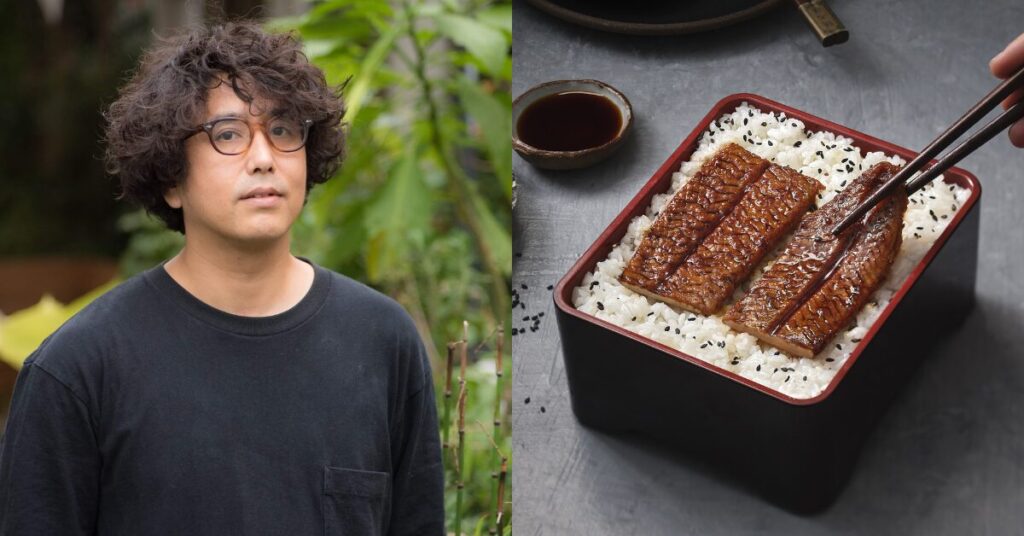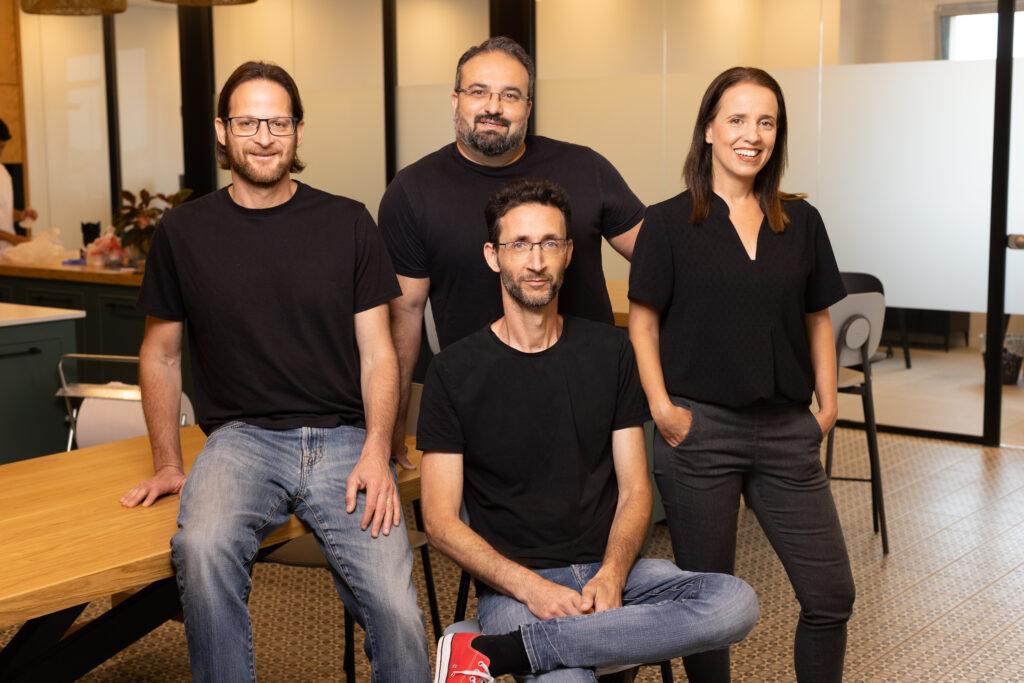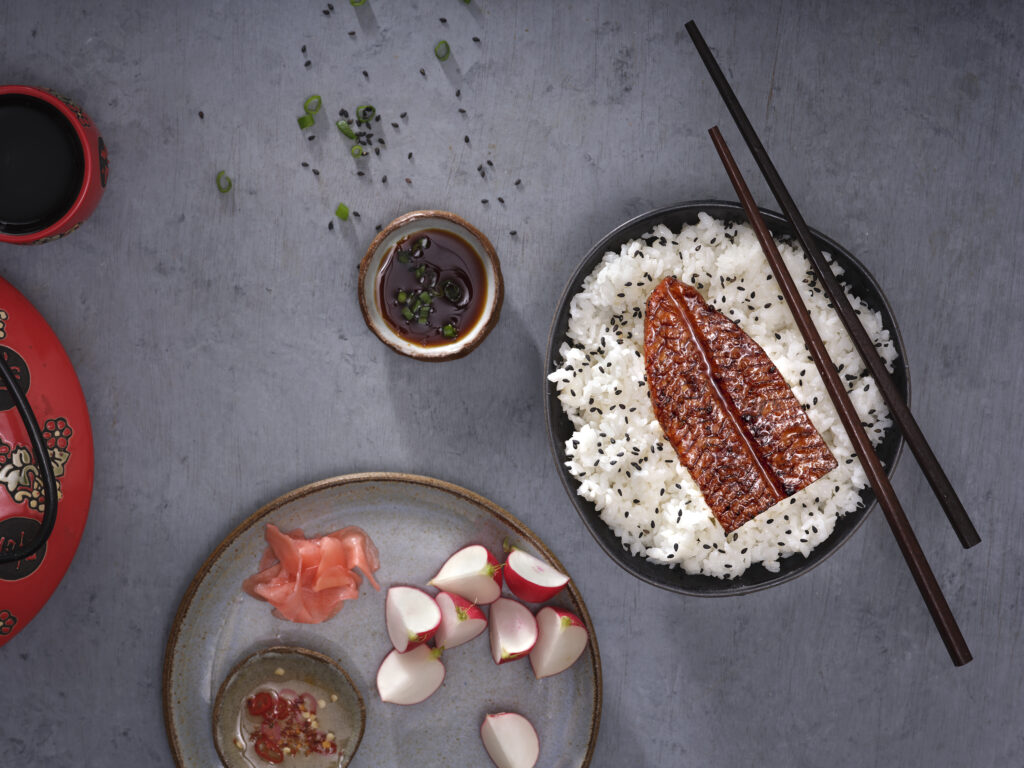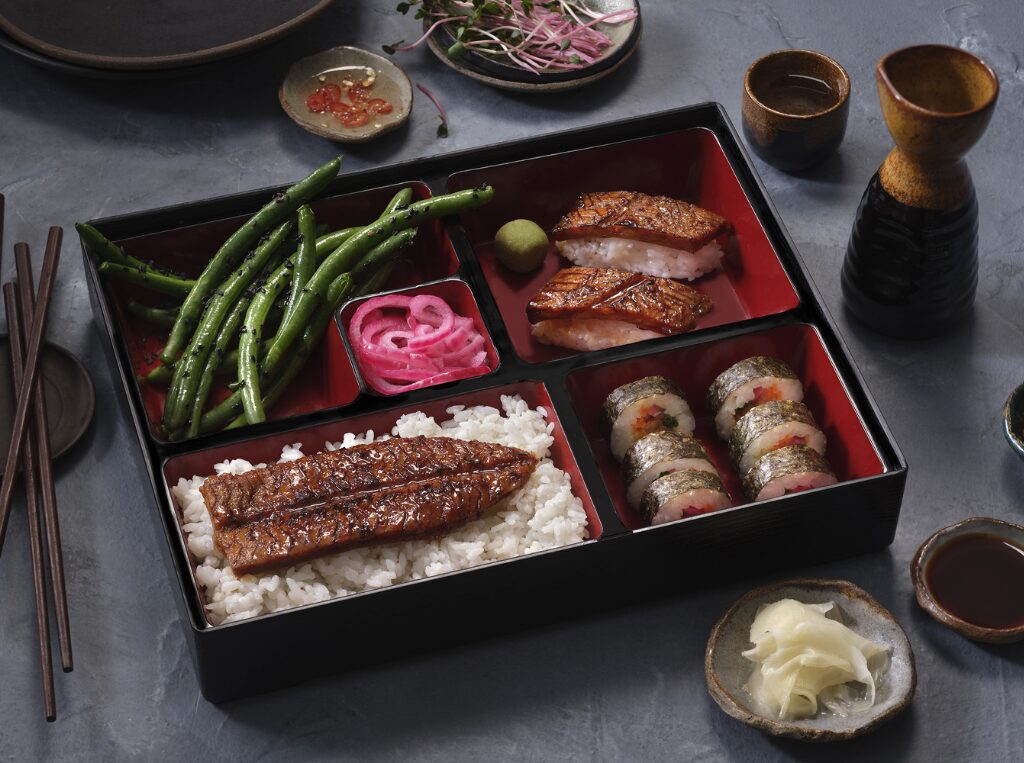Cultured Unagi: Forsea Foods Unveils ‘World First’ Cultivated Eel with Tokyo Eatery Saido
6 Mins Read
Israeli food tech startup Forsea Foods has unveiled the first prototype of its cultivated eel, linking up with Tokyo vegan restaurant SAIDO to create dishes with the cell-cultured fish. It aims to launch the seafood product by 2025.
Forsea Foods, the only known company working on cell-based eel, has created the first prototype of its cultivated eel. The startup has partnered with Japanese chef Katsumi Kusumoto, executive chef and owner of Tokyo vegan restaurant Saido, to create two traditional dishes using its cultured fish, showcasing its application and potential.
Kusumoto and Forsea Foods have developed two popular Japanese dishes – unagi kabayaki (marinated grilled eel over rice) and unagi nigiri (a type of sushi). Now that the company has achieved a working proof of concept – which it claims features “the same tender, succulent texture and rich savoury flavour as real eel” – it is prepping for scale-up.

Forsea Foods’ cultured eel will be welcomed by Japan
Founded in 2021, Forsea Foods employs a proprietary method for culturing seafood, using organoid technology to create 3D microtissues comprising fat and muscle, which can mimic the functions and structure of organs. These spontaneously differentiate into edible cells, replicating the natural process of cell formation.
Moreover, the cell lines can self-organise into tissue structures without the need for scaffold support. This simplifies the production process, eases supply chain bottlenecks for eel meat, and improves scalability. It also enables efficient and cost-effective production by significantly decreasing the reliance on costly growth factors, which will help Forsea Foods disrupt a $4.3B market and bring its eel closer to price parity with its conventional counterpart.
The company, which won the Startup Pitch Hour Prize at the Asia-Pacific Agri-Food Innovation Summit last October in Singapore, has previously raised $5.2M in seed funding, and now expects to add to that amount. Partnering with Kusumoto helped showcase the potential of its product. “Unagi is an enduring favourite in Japan,” said the chef. “Its timeless appeal, however, is impacted by a growing awareness among the Japanese population of the need to take a more sustainable approach.”
“Forsea is pioneering the fusion of traditional, high-quality Asian cuisine with groundbreaking technology to create the world’s first cultured unagi – one that will provide the consumer with a genuine seafood experience without putting further strain on aquatic life,” said Forsea Foods co-founder and CEO Roee Nir.
The news will likely be welcomed by Japan’s government, with Prime Minister Fumio Kishida endorsing cellular agriculture last year and announcing plans to create a sector for these novel foods to reduce the country’s climate footprint. “We will develop the environment to create a new market, such as efforts to ensure safety and the establishment of labelling rules, and foster a food tech business originating in Japan,” he said.
To that end, the government awarded ¥1.87B ($13.1M) to Tokyo-headquartered IntegriCulture last month, which has created a cellular agriculture infrastructure platform called CulNet and claims to have developed serum-free cultivated chicken and duck meat at a fraction of the cost needed for animal-based growth factors.

However, Japan’s regulatory framework will soon become more complicated, after the Ministry of Health, Labour and Welfare (which will continue to oversee food safety) transfers its food hygiene standards division to the Consumer Affairs Agency in April. It means companies must liaise with two agencies on regulatory conversations, but does make Kishida the ultimate person responsible for these matters.
A spokesperson for Forsea Foods confirmed that the company is communicating with regulatory authorities in Japan, as well as Singapore. Saido has already been serving vegan unagi to diners, and once regulatory approval comes through, the restaurant intends to serve the cultivated eel too.
Are there any concerns about potential backlash from patrons over a vegan restaurant serving cultured meat? “Forsea’s co-founder Iftach Nachman is an ideological vegan… For him, cultivated meat is vegan,” said the Forsea Foods spokesperson. “We believe that the decision whether cultivated meat is vegan or not really depends on one’s opinion. We believe that there is a certain segment of the vegan population that welcomes cultivated meat as a means of overcoming the challenges of the traditional industry.” [Since it is made from extracted animal cells, cultivated meat isn’t usually regarded as vegan-friendly – for an ethical take, this is a good read.]
The spokesperson added: “Saido is not only for vegans, but also for customers who come for excellent cuisine and new dining experiences.”
Overfishing and pollution have left eels endangered
Both Kusumoto and Nir touched upon a similar theme – the decline of conventional eel populations as a result of overpopulation and pollution. In Japan, which consumes over 70% of all eel catch, the fish has maintained luxury status, with wholesale prices reaching $40 per kg, according to one estimate (Forsea Foods predicts this to be $60 per kg in wholesale, and $250 per kg for restaurants).
But eel consumption has declined over the last two decades, falling from about 160,000 tons in 2000 to just over 60,000 tons in 2021. And this isn’t just limited to Japan – in the EU, eel populations have diminished dramatically, decreasing by 98% from 1980, leading to an export ban on eels in 2010.
This has resulted in eel becoming a critically endangered species, with overfishing, poaching, illegal trading, and breeding troubles all playing a role. Known as mysterious creatures, these fish undergo an unusual metamorphosis, with a breeding process that includes a 6,500-km-long migration to one of two spots: the Sargasso Sea (near the Bermuda Triangle), or off Guam. This makes captive breeding difficult, especially amidst elevating demand for the fish.
The overfishing of eels, meanwhile, disrupts the marine and freshwater ecosystems they come from – these fish maintain a balance in biodiversity by preying on smaller fish, ensuring that no single marine species takes over the ecosystem. Eels, in turn, are a food source for birds like the grey heron and the great cormorant.

This underpins the need for alternatives to conventional eels. While Forsea Foods is the sole company dealing with cultivated versions of the fish, fellow Israeli company Steakholder Foods unveiled a 3D-printed alternative in December (it plans to include cultured eel cells in the product at a later stage, if costs allow). And New York’s Ocean Hugger Foods and Japanese giant Nissin already have plant-based eels on the market (using aubergines and soy protein, respectively).
Now, Forsea Foods hopes to launch its eel commercially in 2025, as it seeks strategic partners in Japan and across Asia. To advance its progress in this region, it has formed new engineering and food applications departments, and appointed a new business development manager in Japan. The company also views the EU and the US as rapidly developing markets.
“This year, we will [be] working to improve process parameters in our lab and increase our scales,” revealed the spokesperson. “In addition, we are planning to conduct a few tasting events of our products, expand our relationships in Asia and launch our next financing round.”
The Israeli startup’s unveiling of its cultivated eel comes a week after fellow Rehovot-based company Aleph Farms gained the country’s first approval for cultured meat, and the world’s first for cell-based beef. “It is great to see more geographies approve cultivated meat and, equally important, to see more types of cultivated animal proteins entering the market,” Robert E Jones, president of Cellular Agriculture Europe and co-founder of the Global Cellular Agriculture Alliance, told Green Queen. “Israel, the Netherlands, Singapore, the United States, and the UK have made early investments to build complementary protein ecosystems, and the dividends are now paying off.”



